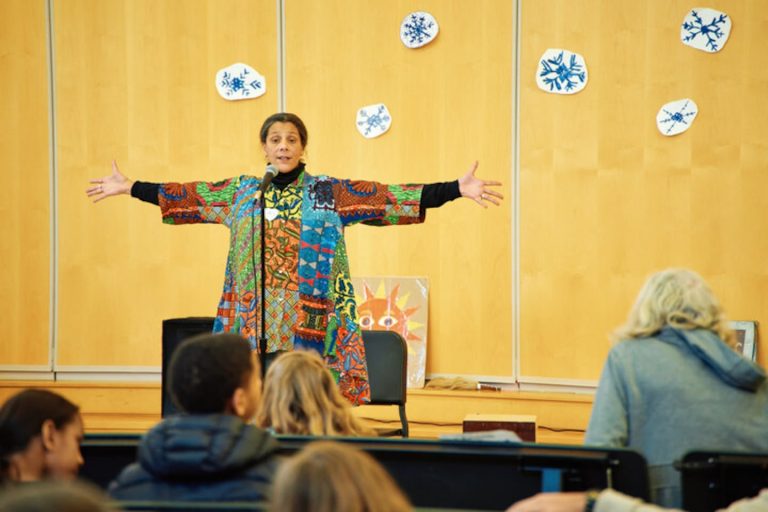Valerie Tutson, the executive director and festival director for the Rhode Island Black Storytellers nonprofit, made those points on the Rhode Island Report podcast during Black History Month.
Tutson, who been celebrating Black voices and traditions for more than 25 years, also recently joined Marlon Carey for a performance and interview on Rhode Island PBS, with Anaridis Rodriguez on “Generation Rising.”
“There’s power in who tells the story of who they are,” Tutson said. “And one of the things that I love about this principle of Kwanzaa, kujichagulia, which means self-determination, is we’re going to name ourselves, we’re going to define ourselves, we are going to put our own experience out there in our own way.”
People make decisions all the time about what stories sell and what stories are deemed newsworthy, she noted.
“And that’s not always the best stories that people need to hear,” she said. “They are the stories that are going to be sensational, and that’s problematic.”
Many of those stories focus on trauma, Tutson said.
“We are spending a lot of time, a lot of energy, a lot of resources, capturing traumatic experiences,” she said. “We are spending a lot of time and energy elevating experiences of people who are victims of violence or perpetrating violence, or barely escaping violence.”
While those can be important stories to tell, it’s important to convey the wider variety of Black experiences, and to avoid leaving the audience in a traumatized place, Tutson said.
“One of the things that has always been vital to the work that we do at (Rhode Island Black Storytellers) is to, even when we’re telling hard stories, not to leave us there,” she said.
While speaking about trauma can be healing, she said there comes a point where the storyteller has a responsibility to those hearing the story.
“So I can’t leave my people in the dark,” Tutson said. “It’s like the old folktales: Yeah, you go into the woods and, yeah, the wolf is there. But you kill the wolf.”
Tutson talked about the Funda Fest, an annual celebration of Black storytelling now in its 26th year. She explained that “funda” is a Zulu word that means “to learn,” saying, “Storytelling is our most ancient way of teaching and learning.”
The festival, which ran from Jan. 19 to Feb. 3, featured performers ranging from 5 to 82 years old, and Tutson outlined plans to launch a storytelling training program later this year.
“We’re looking for people who love storytelling,” she said. “Maybe they’re already artists, they might be poets, they might be spoken word artists, they might be musicians, they might be teachers, they might be librarians.”
The program would give those people more confidence to tell stories at schools, libraries, and other place in the community, she said. Those interested can sign up at ribsfest.org.
To get the latest episode each week, follow Rhode Island Report podcast on Apple Podcasts and other podcasting platforms, or listen in the player above.
Edward Fitzpatrick can be reached at edward.fitzpatrick@globe.com. Follow him @FitzProv.





